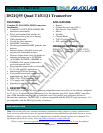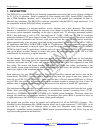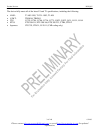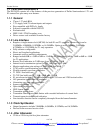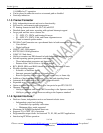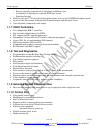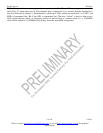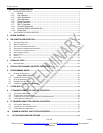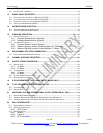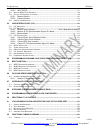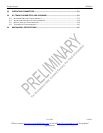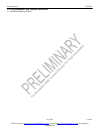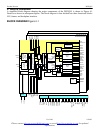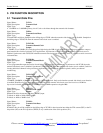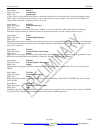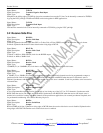
Product Preview DS21Q55
5 of 248 012103
Please contact telecom.support@dalsemi.com or search http://www.maxim-ic.com for updated
information.
§ Requires only a 2.048MHz master clock for both E1 and T1 operation with the option to use
1.544MHz for T1 operation
§ Can be placed in either the receive or transmit path or disabled
§ Limit trip indication
1.1.5 Framer/Formatter
§ Fully independent transmit and receive functionality
§ Full receive- and transmit-path transparency
§ T1 framing formats include D4 (SLC-96) and ESF
§ Detailed alarm- and status-reporting with optional interrupt support
§ Large path- and line-error counters for:
− T1 – BPV, CV, CRC6, and framing bit errors
− E1 – BPV, CV, CRC4, E-bit, and frame alignment errors
− Timed or manual update modes
§ DS1 Idle Code Generation on a per-channel basis in both transmit and receive paths
− User-defined
− Digital milliwatt
§ ANSI T1.403-1998 support
§ E1ETS 300 011 RAI generation
§ G.965 V5.2 link detect
§ Ability to monitor one DS0 channel in both the transmit and receive paths
§ In-band repeating-pattern generators and detectors
− Three independent generators and detectors
− Patterns from 1 bit to 8 bits or 16 bits in length
§ RCL, RLOS, RRA, and RAIS alarms now interrupt on change of state
§ Flexible signaling support
− Software- or hardware-based
− Interrupt generated on change of signaling data
− Receive-signaling freeze on loss of sync, carrier loss, or frame slip
§ Addition of hardware pins to indicate carrier loss and signaling freeze
§ Automatic RAI generation to ETS 300 011 specifications
§ Expanded access to Sa and Si bits
§ Option to extend carrier-loss criteria to a 1ms period as per ETS 300 233
§ Japanese J1 support
− Ability to calculate and check CRC6 according to the Japanese standard
− Ability to generate yellow alarm according to the Japanese standard
1.1.6 System Interface
§ Dual two-frame, independent receive and transmit elastic stores
− Independent control and clocking
− Controlled-slip capability with status
− Minimum-delay mode supported
§ Maximum 16.384MHz backplane burst rate
§ Supports T1 to CEPT (E1) conversion
§ Programmable output clocks for fractional T1, E1, H0, and H12 applications
§ Interleaving PCM bus operation



